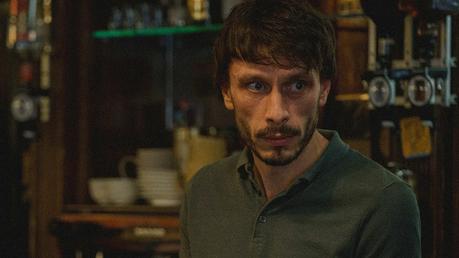It must have been excruciatingly painful to relive the traumatic experience of being abused for a long time; let alone turn it into a comprehensive, candid story and, in the end, star in it. Yet, that’s exactly what Scottish comedian, Richard Gadd, does in Baby Reindeer. The seven-episode mini-series makes its way from a one-man play in Edinburgh en route to London and finally becoming Netflix‘s sleeper hit.
It’s a recount of the writer’s personal experience of being stalked and constantly harassed for years to come. Presented in a fictionalized autobiography, this show is both honest and agitating at the same time — as darkly funny as Phoebe Waller-Bridge‘s Fleabag and as provocative as Michaela Cole‘s I May Destroy You. Fascinating as it is, seven episodes can be hard to swallow given the emotional roller-coaster that follows.
Throwing the audience into the character’s psyche and trains of thought via voice-over is the preferred narrative vehicle – working in a similar vein as Fleabag‘s breaking-the-fourth-wall methods – as the protagonist reports the harassment he receives to the police. At times, it feels like a cheat sheet; but, given the nature of the source materials (re: the one-man play), it’s understandable – especially in deconstructing the narrator’s mind through in-line sequences that often isn’t as straightforward as what’s spoken. The reflective irony is what gives Baby Reindeer the contemplative look into past trauma as the plot itself.

sent from my iPhone
It all starts with a small act of kindness. Donny Dunn (a fictional surrogate of Gadd) works as a bartender to support his floundering comedy career. In the middle of his shift, his eventual stalker, Martha (Jessica Gunning), walks into the bar, looking upset and unable to afford anything. Out of sympathy, Donny offers her a cup of tea on the house. Unbeknownst to him, destiny has something on the agenda for him.
Electrified by what she perceives as an act of caring, Martha’s mood changes drastically and so does Donny’s life. The grumpy woman begins to blabber about her life and her career as a successful lawyer living in a penthouse. We notice that something is not quite right; Donny feels that, too. But, he keeps entertaining the guest; and that might be his honest mistake to begin with. Soon, she’s becoming a bar regular and starting to shower Donny with compliments and audacious flirts.
When the bartender-cum-comedian realizes he’s in too deep into Martha’s dangerous game, it’s too little too late. The next thing we know, he begins to receive hundreds of unsolicited emails – sometimes harmless, but mostly annoying – full of typos and ending with faux ‘sent from my iPhone’ remarks every night. She also begins to call him ‘baby reindeer’ for a reason that we will learn soon.
The question is: has it always been the case of a small act of kindness that leads to a series of misfortune?
Gadd throws his vulnerability into the mix with sensibility. His floundering comedy career is one thing; he’s cleverly writing unfunny comedic acts that, albeit miserable, we can sympathize with. However, the most ironic element thrown into the mix is Donny’s agency in the whole situation. As if reliving the harrowing moments in his life isn’t difficult enough, admitting that he’s not completely in the clear is the boldest thing that Baby Reindeer devises to craft an ironic but powerful story.
Donny handles the situation a little awkwardly in most cases as if he wants to conceal something, hence the tiptoeing in decision-making. Gadd portrays him as partially naïve, partially gullible, and unconsciously vain. There’s a time when he will show compassion towards Martha and attempt to humanize her – putting himself in her shoes. However, there’s also another time when falling into Martha’s constant abuse is the lesser risk he’s willing to take rather than tainting his reputation. From the audience’s perspective, it’s apparent that there’s a sense of impending confusion that will only be revealed later on.
While Donny is meticulously written — blatantly delving into the writer’s vulnerable psyche, the story is only as powerful as how the antagonist is portrayed. Martha isn’t necessarily a textbook villain – unsympathetic and downright anti-social; everything about her (and Donny, as well, in that matter) is highly nuanced. Something about her screams something heartbreakingly pitiful and she might have tenderness lies within her. Gunning transforms completely into Martha, making us irked by her laughter or the way she types. Even from the way she types her emails, we can see she yearns for something, but we can’t cast away our loathsome towards her constant abuse, even when she isn’t physically present on screen.

Strangrr then Fiction
That kind of typos immediately reminds me of Martha and her persistence. Imagine living in terror just by seeing that kind of email popping up on your screen every minute; that must feel horrible. It makes Donny feel like living in a haunted house with a ghost that constantly harasses him with a sinister presence. However, that’s not the only ghost that keeps haunting him.
Martha pops in every situation uninvited. She’ll walk into the bar, heckle him in his stand-up routines, and wait for him at the bus stop. Her presence practically shadows him. Yet, her existence only unravels bigger trauma that looms over Donny’s days.
Midway into the mini-series, Donny reveals another flash-back, even further than the stalker’s emergence, when he’s even greener in the comedy scene. Without neglecting the predatory impact of Martha, he divulges another trauma that confuses and devastates him – making him emotionally hollow. He’s wearing the trauma as if he’s having a scarlet branding everywhere he goes. Encountering Martha only makes it even worse. Like a heat-seeking missile, the trauma always finds a way to render him powerless; that’s something that gives the stalker leverage in the power dynamic between them.
The constant feeling of fear, confusion, and shame dictates his every move, threatening his relationship with everyone he cares about – including, Teri (Nava Mau), a transgender therapist he secretly dates. Gadd‘s emotional writing, putting aside his victimized personality, gives in-depth context to why this piece is an important story to tell. Baby Reindeer feels like an outlet for him to confront his trauma and make peace with himself no matter how dire the consequences to his identity. As the writer states in his personal Instagram, the point of the story isn’t to out the predators that did him wrong.
As the story wraps, I learn that Gadd‘s story is essentially a tale of how the cycle of abuse keeps ruining other lives. What happens to Donny and, as we eventually learn, Martha is a product of abuse that keeps repeating itself. Even the title is a past remnant of the bleak reality that might happen to everyone. However, this isn’t a story of revenge; this is a courageous confrontation that never takes the subject matter lightly – even when it’s still a tough-watch.
Verdict: Baby Reindeer is a dark yet funny channel for the writer-cum-star, Richard Gadd, to confront his trauma for being abused and stalked for years and to acknowledge his agency in the ordeals. It’s like catching a heat-seeking trauma missile by hands — tough but alluring.
